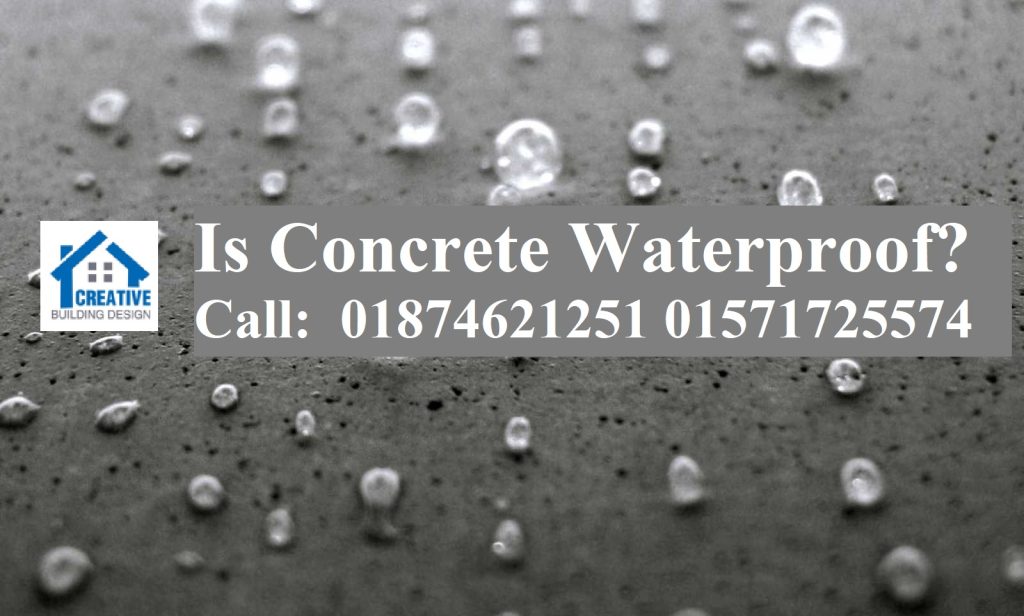
When it comes to concrete, the answer is not always clear. Waterproofing concrete is a complex process that involves adding a sealer to the surface to prevent water from seeping in. However, even the best sealer won’t make concrete 100% waterproof. Many factors can affect the waterproofing of concrete, such as the porosity of the concrete, the type of sealer used, the climate, and the amount of water exposure.
One of the most common questions we get asked is whether concrete is waterproof. The answer is both yes and no. While concrete is a very strong and durable material, it is not completely impervious to water. Water can seep into the concrete and cause problems over time, such as cracking, spalling, and deterioration. That’s why it’s important to use a waterproofing sealer on concrete to help protect it from water damage.
There are two types of waterproofing sealers: film-forming and penetrating. Film-forming sealers form a barrier on the surface of the concrete that prevents water from seeping in. Penetrating sealers penetrate the concrete and form a water-resistant barrier within the pores. Both types of sealers are effective at waterproofing concrete, but film-forming sealers provide the best protection.
When choosing a waterproofing sealer, it’s important to consider the porosity of the concrete. The more porous the concrete, the more likely it is to absorb water. If the concrete is very porous, a penetrating sealer may be the best option. If the concrete is only slightly porous, a film-forming sealer may be sufficient.
It’s also important to consider the climate when choosing a waterproofing sealer. If the concrete will be exposed to harsh weather conditions, such as freezing temperatures or intense sunlight, a film-forming sealer is the best option. If the concrete will be in a more moderate climate, a penetrating sealer may be sufficient.
The amount of water exposure is another important factor to consider when choosing a waterproofing sealer. If the concrete will be regularly exposed to water, such as in a pool deck or patio, a film-forming sealer is the best option. If the concrete will only be exposed to water occasionally, such as in a garage or basement, a penetrating sealer may be sufficient.
No matter what type of waterproofing sealer you choose, it’s important to follow the manufacturer’s instructions carefully. Applying the sealer incorrectly can result in reduced protection or even damage to the concrete. If you’re not sure how to apply the sealer, ask a professional for help.
With proper care and maintenance, concrete can last for many years. However, it’s important to remember that concrete is not completely waterproof. Water can still seep into the concrete and cause problems over time. That’s why it’s important to use a waterproofing sealer on concrete to help protect it from water damage.
Contents
How to waterproof concrete?
Waterproofing concrete is a necessary step in protecting this durable material from the elements. There are a few different methods that can be used to waterproof concrete, and the best method for a particular application will depend on the specific needs of the project. One common method for waterproofing concrete is to apply a sealer to the surface of the concrete. This can be done with a brush, roller, or sprayer, and the sealer will form a barrier that will prevent water from penetrating the concrete. Another method for waterproofing concrete is to coat the surface with a waterproofing membrane. This type of membrane is applied as a liquid and will cure to form a durable, waterproof barrier.
When should I use waterproof concrete?
There are many types of concrete mixes on the market today. So, when should you use a waterproof concrete mix? The answer may surprise you.
First, let’s define what waterproof concrete is. Waterproof concrete is a type of concrete that has been treated with a water-repellent agent. This agent causes the concrete to become less permeable, so that water will not seep through the concrete and cause damage.
Waterproof concrete is often used in construction projects that require concrete that will be exposed to water or moisture, such as in bathrooms, kitchens, and laundry rooms. Waterproof concrete is also used in outdoor projects where there is a risk of rain or snow, such as patios, walkways, and driveways. Now that we know what waterproof concrete is, let’s talk about when to use it.
If you are working on a construction project that will be exposed to water or moisture, then you should use a waterproof concrete mix. This will help to protect your project from water damage.
If you are working on an outdoor project where there is a risk of rain or snow, then you may want to consider using a waterproof concrete mix. This will help to protect your project from weather damage.
So, there you have it. These are just a few of the times when you should use a waterproof concrete mix. If you have any questions about using waterproof concrete, be sure to ask your concrete supplier.
How to waterproof concrete floor?
Assuming you would like tips on how to waterproof a concrete floor:
1. Inspect the floor for cracks or holes. Repair any cracks or holes with hydraulic cement.
2. Spread a generous amount of waterproofing sealer on the floor with a paint roller.
3. Allow the sealer to dry for the amount of time specified on the product label.
4. Apply a second coat of sealer, if desired.
5. Allow the floor to dry completely before walking on it or placing furniture on it.
Final Words:
Concrete is not 100 percent waterproof so sometimes water passes through concrete. Water damage concrete, make concrete 100 percent waterproof mix chemicals. Cement is made of sand, limestone, and clay. Mix water with cement and it will harden or set in about 10 minutes. Add color to the concrete for decorating purposes or drainage purposes only.
